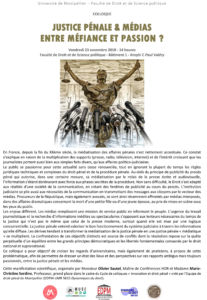Symposium: “Criminal justice and the media: between mistrust and passion?”
This event has passed!
Faculty of Law, Building 1, Lecture Hall C Paul Valéry – 39 rue de l’Université, 34000 Montpellier.
Conference open to the public, free admission.
 In France, since the end of the 20th century, media coverage of criminal cases has increased significantly. This can be explained by the proliferation of media outlets (press, radio, television, internet) and the growing interest of journalists in both simple news items and political and legal cases.
In France, since the end of the 20th century, media coverage of criminal cases has increased significantly. This can be explained by the proliferation of media outlets (press, radio, television, internet) and the growing interest of journalists in both simple news items and political and legal cases.
The public is fascinated by this constantly changing news, while mostly ignoring the technical and complex legal rules of criminal law and criminal procedure. Beyond the principle of public access to criminal trials, which allows, to a certain extent, for media coverage by the print and broadcast press, information now spreads rapidly to the secret phases of the proceedings. Not without difficulty, the law has adapted to the realities of a communication-driven society by creating windows of publicity during trials. The judicial institution also bends to the necessities of communication by transmitting messages to citizens through the media. Public prosecutors, but also lawyers, have recently clashed in the media in dramatic cases concerning the death of a young girl or a young wife, at the cost of staging events before the eyes of the public.
The stakes are different. The media fulfill a public service mission by informing the people. The urgency of journalistic work and the search for exclusive or sensational information are at odds with the necessary slowness of the justice system, which does not operate at the same pace as the modern press, especially when it is driven by competition. The criminal justice system seeks to promote the proper functioning of the judicial system through the information it disseminates. There is a growing tendency to turn the media coverage of criminal justice into "media" criminal justice. The clash between these distinct objectives is a source of conflict, the resolution of which depends on the perpetual quest for a balance between the major democratic principles and fundamental freedoms enshrined in national and supranational law.
The aim of this symposium is to bring together the perspectives of academics and practitioners on this issue, in order to take stock of the current situation and explore the future prospects for the ambiguous but always passionate relationship between criminal justice and the media.
This scientific event, organized by Olivier Sautel, Senior Lecturer, and Marie-Christine Sordino, Professor, is part of the series of symposiums on "Innovation and Criminal Law" created by the Montpellier Criminal Law Team (EDPM-UMR 5815 Dynamics of Law).
